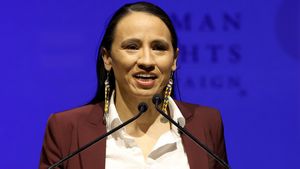“I’m in my 40s and sometimes date men who are in their 20s. When there’s a big income gap, I’m willing to foot the bill for both of us to do the things I enjoy and have a good time. But I can’t tell if he’s actually into me…or just into my money. How do I figure it out?”
As we age, we discover how we prefer to spend our time and aspire to do those things more often. That’s how it is for me, at least; people will have to pry this Six Flags flash pass from my cold, dead hands, because if going to Magic Mountain means we’ll be waiting in lines all day, then I’m not going.
A VIP ticket at twice the price is worth it to me (personal finance pundits are aghast right now), because shouldn’t part of accruing wealth include using it to live a happy queer life? I think so. As time goes on, we naturally get more stubborn about how we spend our money and attention, and that conviction can lead to friction when a new special someone enters your life.
Your concern that he might be more interested in financial security than emotional intimacy is valid. You want to have a good time and bring him along, but you also don’t want to feel like he’s using you as an ATM, particularly if you’ve busted your ass for years (or decades) to get to where you are now.
Age-gap relationships might also mean partners have different financial priorities and expectations because they’re navigating different phases of life. You want to set clear boundaries but not seem so uptight about sharing resources that you scare the handsome fella off.
The most immediate solution is to get a little vulnerable and share your anxiety with him directly. If you’re still getting to know each other, frame this conversation as being about the dynamic in general, rather than specifically about you and him. That way, it doesn’t feel like a personal attack. Decide if you want the dynamic to veer away from “sugar daddy” and toward breadwinner, then communicate those goals so that the two of you can brainstorm about it together. If he’s interested in you more than your wallet, your vulnerability will signal confidence, which is sexy. If he’s only in it for the free trips, his disengagement will tell you what you need to know.
WATCH FOR RED FLAGS
Look out for other indirect signs that indicate someone is more interested in winning over your wallet than your heart. Notice if your conversations frequently turn to money, luxury, or career success and to who usually takes the conversations there (tea: It might be you). Also notice what topics are avoided. When you try to bring up your family or feelings, does he lean in or tune out?
Pay attention not to his interest in the money stuff itself but to whether he cares about it because you care about it. If he sees that it’s important to you and is attentive to that, that’s a plus in my book. If he shrugs it off, leaving the topic unaddressed, it could snowball into resentment or a bigger problem as things progress.
You might have to take the lead here. If talking about emotions or other sticky subjects is uncomfortable for him, initiate more at the start and model the conversation without puppeteering its direction. This can help cultivate honesty and trust while getting the answers you seek.
SET BOUNDARIES FOR FINANCIAL INDEPENDENCE
If you want to be generous and treat him to a good time, do that wholeheartedly and without expecting reciprocation. Establish clear boundaries and communication early on when you’re dating someone. This will help avoid assumptions or implications that you’re willing to be a main source of his financial support before actually being in a relationship container.
Keep some financial separation and incorporate dates that match your date’s budget, not just your own. If you can’t have a good time without big expenditures in the picture, that’s about you, not him. It might be worth doing a little self-study to explore why that is. When he suggests a coffee shop instead of a high-end restaurant, embrace it rather than reverting to your agenda; these moments create opportunities for intimate connection, and they’ll help you determine whether your date prefers your company over your credit card.
Be open about your financial philosophy. Discuss how you view money, sharing resources, and building a future with someone. A partner interested in you rather than what you can buy them will engage meaningfully in these conversations.
FIND BALANCE
For us personal finance people who love nothing more than answering a question with an abacus, the go-to money advice for couples is to split expenses in proportion to income. If you make $100,000 and he makes $50,000, you pay two-thirds of the expenses, and he pays the other third. That way you harmoniously skip off into the sunset together.
While this rule can work for long-term relationships, it tends to fall apart when dating because people are sensitive about sharing what they earn and can accommodate, so there isn’t that same foundation of trust yet. Be proactive and set the balance on the fly; the healthiest relationships, regardless of income differences, involve both partners contributing in meaningful ways, and these contributions might not be financial. They could be emotional support, practical help, or simply making your life richer through their presence.
REFLECT ON YOUR DEFINITION OF WEALTH
Our society is work-obsessed. For some, an outcome of this focus is that by midlife you’ve reached financial success, but at the expense of being time-poor or malnourished in other areas. If you date someone navigating a different money situation, the imbalance could bubble to the surface, which can feel confronting if you’re a workaholic.
You’re cranking on the monetary wealth. Now, how is your relational wealth going? Or maybe your physical health, spiritual wealth, or sense of purpose? It can feel scary to relax the thought patterns and systems of success that have gotten you to where you are now, but doing so might unlock new categories of nourishment you didn’t realize you needed. Vibe on this idea of holistic wealth — feeling fulfilled in all the areas of your life, not just your bank account — and it will help ensure you have no regrets later in life.
Do you like him? Do you feel valued and appreciated? Is the relationship contributing to your social and relational wealth while also not being detrimental to your monetary wealth? If the answers to all of those questions are yes, it seems like a green light to me. Remember that finding a genuine connection takes time, and there’s no shame in protecting yourself while remaining open to love.
By maintaining healthy boundaries while also leading with heart, you’re more likely to find partners who value you for who you are, not what you can provide, while also having a good time.
Nick Wolny is Out magazine’s finance columnist. He writes Financialicious, a personal finance newsletter tailored toward queer readers, and is working on his first book, Money Proud, which releases later this year. NickWolny.com @nickwolny
Have a burning money question? Call or text the Financialicious hotline at (323) 207-9969 – your question might get answered.
This article is part of the Out January/February issue, which hits newsstands February 4. Support queer media and subscribe— or download the issue through Apple News, Zinio, Nook, or PressReader starting January 23.






































































